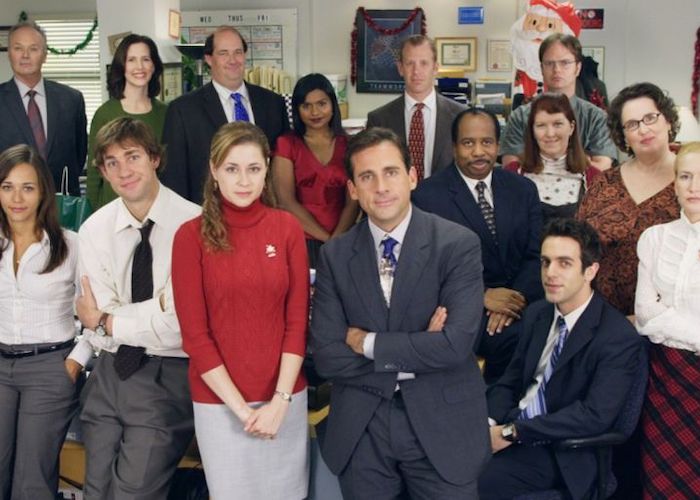13 Ways ‘The Office’ Is Still The Most Realistic Show On Real Jobs — Ever

Before you say, “But wait, isn’t The Office a satire?” let me stop you. I know the world of The Office was created for entertainment and ultimately, to keep viewers hooked. Characters like Dwight, Michael, and even Angela, Erin, and Andy are exaggerated versions of the people we’ve most likely met in our professional lives. The Office perfectly and hilariously captured the zeitgeist of 2000’s workplace comedy, and there are so many reasons why its popularity will live on forever.
What I loved most about The Office was how, regardless of its oftentimes cartoonish representations of characters, it actually felt really realistic about jobs, career trajectory, and office culture. Looking back, the many character flaws are the flaws we see in our coworkers and bosses all the time — even in today’s ‘work from home,’ Zoom culture. The awkward and frustrating dynamics of the office environment is not so far off from real-life work. Here are some examples of The Office that prove it’s actually the most realistic representation of IRL office life.
1. Pam’s failed attempt at becoming an artist
One of the plots that were simultaneously disappointing and brutally realistic was Pam’s yearning to be “more.” She went to art school to achieve her dreams of finding a job that would better use her skillset, and that just…never happened. She stayed at Dunder Mifflin and gave herself a raise, eventually becoming the office manager after years of working at the reception desk. I hate that for Pam, and I hated that she was stuck at Dunder Mifflin while Jim invested $10,000 into his new sports startup (and bought his family’s home) without telling Pam. He went on to pursue his dream job, while Pam held on to the steady work. As much as their relationship frustrated me toward the end, I see that kind of imbalance everywhere. I’m actually glad that The Office didn’t give all of its character what they wanted, because that doesn’t often happen in real life.
2. Everyone is kind of pretending to know what they’re doing, including your boss
At the end of the day, we’re all figuring things out as we go. The Office did a great job at showing most of us aren’t going to be the masters of our craft 24/7. We’re all faking it to some degree.
3. Meetings that could have been emails
These days, pointless in-person meetings have become pointless in-person Zooms, but you catch my drift. Sometimes you will have a manager who schedules an abundant amount of meetings just because they can.
4. Forced office parties
Not so much a thing these days, forced happy hours are just about as bad as they’re portrayed in The Office. Maybe nobody comes to work dressed as an elf or gets as hammered as Meredith did (although it’s not unheard of), but one this is for sure: most forced office parties and happy hours are the pits. We all want to go home and take off our bras and not think about work.
5. People like Ryan are somehow always hired and never really fired
Even though Ryan, who’s totally mediocre, starts off as a temp, it’s shown time and time again how ineffective he is at his job, and that Dunder Mifflin would save some money by trimming his position. Unfortunately, many of us have dealt with watching the mediocre white guy not only keep his job, but get awarded with raises and promotions. Le sigh.
6. Using employees’ personalities against them
The classic example of this kind of toxic leadership is Michael Scott and Dwight Schrute. Dwight adores Michael, and believes that one day, if he serves as Michael’s loyal office companion who carries out all of Michael’s biddings, he’ll become his #2. As touched as Michael is, he understands he has Dwight under his spell and uses that against him, which is kind of sad! We’ve all experience ass-kissing employees, though they’re likely not as extreme as Dwight.
7. You’ll have to decide who to trust
While we mostly will never work with a Dwight, we’ll work with people who will find chances to throw us under the bus in order to get ahead. And that sucks. Learning who you can and cannot rely on in an office (it’s even harder when you work remotely) is crucial to your survival as an employee. Basically, office politics are real. And it’s best to learn how to navigate them as quickly as possible and, ideally, stay out of them.
8. Things get really weird when your company is acquired
In Season 6, Dunder Mifflin gets acquired by Sabre, and it shakes up the Dunder staff. Usually when a larger company acquires a smaller one, they trim the fat, centralize teams, and eventually merge all processes and establish company-wide rules you might not be used to. Michael leaving in Season 7 was also totally realistic. It’s not rare for executives and directors to bounce soon after a merge or acquisition (as a higher-up, you probably won’t have as much control or say; plus, if you had equity in the company, it’s possible you cashed out and are free to quit without a backup plan).
9. It can be really hard to leave even if you’re unhappy
Nobody is happy to be working at Dunder Mifflin. It’s a job, and it probably pays decently, and most of the employees can clock out at a normal time without putting in bonkers hours. But it’s nobody’s “dream” job — certainly not Pam’s, Jim’s, or even Oscar’s. Yet, we don’t see any main players leave the show (that could also be for creative directional purposes, but still). It’s obvious Pam knows she can do more than be a secretary/Michael’s babysitter. Jim is a good salesman, but he could totally be working somewhere more dynamic. But they stay, as many of us do, because these jobs and our roles are comfortable, and they’re what we know.
10. Inclusion can sometimes be simply performative
One of the main themes in The Office is Michael’s cluelessness when it came to inclusivity. We collectively love Michael, but let’s face it: He was racist and sexist and made for an uncomfortable work environment that was framed as humor. In real life, Michael would have been fired for his behavior and hopefully never hired in a position of power ever again. But Michael’s performative activities (remember the notecard game?) is a hyperbolic example of what many workplaces were recently blasted for this year.
11. It’s easy to let a job consume your identity
While this is mostly Jim, Pam, Dwight, Angela, and Michael’s fault (all of them dated coworkers), it was still interesting to note that Dunder Mifflin became intertwined with many of the character’s personalities (since it’s TV, that was kind of the point, but anyway). The one example of a character who treated the job like a job was Stanley. He wasn’t perfect (remember when he wore the fish mask to look like he was working when in actuality he was napping at his desk?), but he had rigid boundaries. Honestly, in the era of massive burnout, we should all strive to be more like Stanley.
12. The bosses who micromanage you the most know the least
Michael was the biggest micromanager who knew nothing about even the basics of business or management, and a lot of this is exaggerated for entertainment. But there’s a nugget of truth here, and the writers must have been pulled it from real-life experiences. If you’ve ever had a micromanaging boss (*raises hand*) you probably noticed that they actually didn’t know as much as they thought they did. And when pressed on this, you probably also noticed your manager got defensive or acted punitively (hopefully not as badly as Michael, who basically threw tantrums in the middle of the office).
13. Sometimes the best job is just an ‘okay job’
Dunder Mifflin wasn’t perfect. Jim and Pam should have left long ago to pursue brighter, more innovative careers. Kelly was clearly meant for a cool marketing job at a startup. Ryan probably should have relocated to Silicon Valley before the DTC bubble burst. But at the end of the day, Dunder Mifflin employees were okay. It’s okay to have an “okay job” as evidence by the brilliantly written essay, “The Dream Job Is Dead, Long Live The Good Enough Job.” I’m guessing the fictional Dunder Mifflin paid their employees fairly, gave raises, offered benefits and 401ks, and maybe even pension plans. As a recovering “dream job”-aholic, I rewatch The Office and think, “Maybe I would have actually been okay here.”
Gina Vaynshteyn is an editor and writer who lives in LA. You can find more of her words on Refinery29, Apartment Therapy, HelloGiggles, Distractify, and others. If you wanna, you can follow her on Instagram or Twitter.
Image via NBC/The Office





